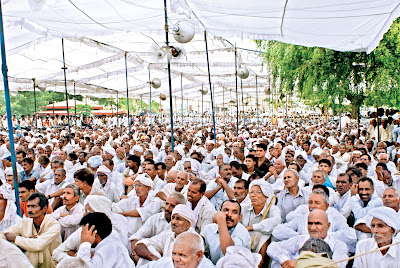 After decades of deafening silence or being hand-in-glove
with caste councils (khaps), the politicos seem to muster courage to speak out
against these kangaroo courts, if Congress president Sonia Gandhi’s forays can
be considered as an indicator.
After decades of deafening silence or being hand-in-glove
with caste councils (khaps), the politicos seem to muster courage to speak out
against these kangaroo courts, if Congress president Sonia Gandhi’s forays can
be considered as an indicator.
Political parties have banked on caste votes to fuel their
journeys to power and therefore it is natural that they don’t tread on the turf
of their benefactors. This is not purely an India-exclusive phenomenon. At the
zenith of Nazi power, the Catholic Church maintained silence on German
atrocities in return for sparing the interests of the Church. Spain’s brutal
dictator Franco too enjoyed similar privileges.
Haryana is not the nucleus of the menace of khaps — its
tentacles reach the nook and corner of the country. Even while public outrage
against khap-ordered atrocities, especially against women, are on the rise,
political leaders are very measured in their response — Sonia too is no
exception to this unspoken rule. Though she condemned the rise in crimes
against women and called for the severest punishment for rapists, her response
to a question regarding the ‘authority’ of khaps was surprisingly mild. She said
only the government and courts have the authority to prosecute people. The
statesman-like statement did not directly attack khaps nor did it say the
kangaroo courts need to be done away with.
Khaps are nothing but an Indian version of Taliban, which
has been instrumental in crushing the lives of millions of women in Pakistan
and Afghanistan. The colour of the flags may differ, but the obsolete and
suppressive ideologies are same.
The khap advisory to get girls married off at the age of 16
to curb rapes is not much different from the logic of proponents of female
genital mutilation that physically and mentally scars millions of women across
the world.
The primitive justification of male superiority and
importance has over the decades created a demographic disaster across the
country with plummeting sex ratios. The result has been an overdose of
testosterone in social life. Coupled with the tradition of glorifying
suppression of women’s rights, an environment dangerous for the fairer sex has
been created.
Though our politicians take umbrage at comments on a wide
range of matters and their wisdom spans from personal etiquette to art,
philosophy, and literature, no one has the courage to take on the scourge of
these extra-constitutional cancers that have been gnawing away at the core of
ideals of democracy and liberty — ironically, guaranteed by the Constitution
and reinforced by court rulings.
Mahatma Gandhi once said that India lives in its villages.
And if the women in our villages are forced to live under the reign of khap
terror, what kind of rule of law can we boast of?
Unlike the urban folk, the rural heartland turns out to vote
in large numbers. When they exercise their electoral franchise, they hope their
representatives will create a better future for them. However, our democratic
model has remained a pathetic failure in this department.
When a country cannot protect its women (No, locking them
inside houses and teen weddings are NOT solutions); when it cannot ensure
freedom of choosing life partners for its youths; when law and order machinery
fails to do its duty, we are no different from the failed states that are our
neighbours.
(This article was published as the editorial column in
Postnoon on October 10, 2012)

No comments:
Post a Comment